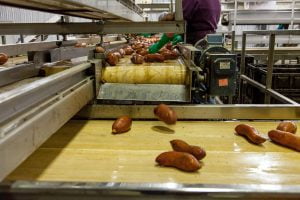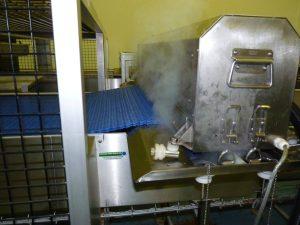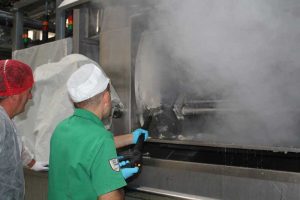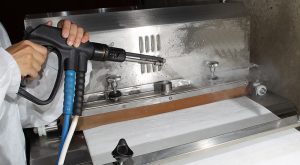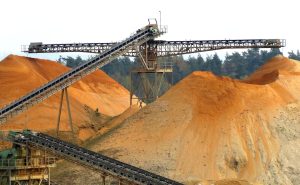Automatic conveyor cleaning systems are a crucial element in modern manufacturing and production facilities. These systems are engineered to efficiently and effectively clean conveyor belts, ensuring they remain free from debris, contaminants and other materials that could compromise product quality and safety. By automating the cleaning process, these systems help to streamline operations, reduce downtime and improve overall productivity.
Automatic conveyor cleaning systems are available in various configurations, including brush cleaners, belt scrapers and air knife systems. These systems are designed to remove a wide range of materials from conveyor belts, including dust, dirt, oil, grease and other substances that can accumulate during the production process. By maintaining clean conveyor belts, these systems help to prevent product contamination, reduce maintenance costs and extend the lifespan of conveyor components.
Summary
- Automatic conveyor cleaning systems are designed to efficiently and effectively clean conveyor belts and keep them free from debris and contaminants.
- Implementing automatic conveyor cleaning systems can lead to increased productivity, reduced downtime, and improved overall equipment efficiency.
- Automatic conveyor cleaning systems improve workplace safety by reducing the risk of slips, trips, and falls, and by minimizing the exposure of workers to hazardous materials.
- These systems play a crucial role in preventing product contamination by ensuring that conveyor belts are consistently clean and free from foreign materials.
- Implementing automatic conveyor cleaning systems can result in cost savings through reduced maintenance, increased equipment lifespan, and improved environmental impact by reducing waste and water usage.
Benefits of Implementing Automatic Conveyor Cleaning Systems
Boosting Productivity and Efficiency
One of the primary benefits is improved productivity and efficiency. By automating the cleaning process, these systems help to reduce downtime and maintenance requirements, allowing production lines to operate at maximum capacity. This can result in increased output and reduced labour costs, ultimately improving the bottom line for businesses.
Enhancing Product Quality and Safety
In addition to improved productivity, automatic conveyor cleaning systems also help to enhance product quality and safety. By keeping conveyor belts clean and free from contaminants, these systems help to prevent product contamination and ensure that finished products meet the highest standards of quality and safety.
Industry-Specific Benefits
This can be particularly important in industries such as food and beverage, pharmaceuticals, and electronics, where product purity is critical.
How Automatic Conveyor Cleaning Systems Improve Workplace Safety

Workplace safety is a top priority for manufacturing and production facilities, and automatic conveyor cleaning systems play a key role in maintaining a safe working environment. By keeping conveyor belts clean and free from debris, these systems help to reduce the risk of accidents and injuries caused by slips, trips, and falls. This can help to lower the incidence of workplace injuries and improve overall employee morale and satisfaction.
In addition to reducing the risk of accidents, automatic conveyor cleaning systems also help to improve air quality in the workplace. By removing dust, dirt, and other contaminants from conveyor belts, these systems help to prevent the release of airborne particles that can pose a health hazard to employees. This can be particularly important in industries where airborne contaminants can lead to respiratory issues and other health problems.
The Role of Automatic Conveyor Cleaning Systems in Preventing Product Contamination
Preventing product contamination is a critical concern for manufacturing and production facilities, particularly in industries such as food and beverage, pharmaceuticals, and electronics. Automatic conveyor cleaning systems play a crucial role in this regard by keeping conveyor belts clean and free from contaminants that can compromise product quality and safety. By removing dust, dirt, oil, grease, and other materials from conveyor belts, these systems help to prevent cross-contamination and ensure that finished products meet the highest standards of purity.
In addition to preventing product contamination, automatic conveyor cleaning systems also help to maintain compliance with industry regulations and standards. Many industries have strict guidelines for cleanliness and hygiene, and automatic conveyor cleaning systems can help businesses to meet these requirements. This can be particularly important for businesses that operate in highly regulated industries where non-compliance can result in fines, penalties, or even legal action.
Cost Savings and Environmental Impact of Automatic Conveyor Cleaning Systems
Implementing automatic conveyor cleaning systems can result in significant cost savings for manufacturing and production facilities. By automating the cleaning process, these systems help to reduce labour costs associated with manual cleaning methods. In addition, by keeping conveyor belts clean and free from contaminants, these systems help to extend the lifespan of conveyor components, reducing maintenance costs and downtime.
In addition to cost savings, automatic conveyor cleaning systems also have a positive environmental impact. By removing contaminants from conveyor belts, these systems help to prevent the release of pollutants into the environment. This can be particularly important in industries where contaminants can pose a risk to the environment and public health.
By implementing automatic conveyor cleaning systems, businesses can demonstrate their commitment to environmental stewardship and sustainability.
Considerations for Selecting the Right Automatic Conveyor Cleaning System

Type of Contaminants
One important consideration is the type of contaminants that need to be removed from conveyor belts. Different cleaning systems are designed to remove different types of materials, so it’s important to select a system that is capable of effectively removing the specific contaminants present in the production environment.
Conveyor System Configuration
Another important consideration is the size and configuration of the conveyor system. Automatic conveyor cleaning systems come in a variety of sizes and configurations, so it’s important to select a system that is compatible with the existing conveyor infrastructure.
Additional Factors to Consider
In addition, businesses should consider factors such as maintenance requirements, energy efficiency, and ease of installation when selecting an automatic conveyor cleaning system.
Case Studies: Successful Implementation of Automatic Conveyor Cleaning Systems
Several businesses have successfully implemented automatic conveyor cleaning systems to improve productivity, enhance product quality and safety, and reduce maintenance costs. For example, a leading food processing company implemented an automatic belt scraper system to remove food debris from conveyor belts, resulting in improved product quality and reduced maintenance requirements. In addition, a pharmaceutical manufacturer installed an air knife system to remove dust and other contaminants from conveyor belts, resulting in improved workplace safety and compliance with industry regulations.
In conclusion, automatic conveyor cleaning systems play a crucial role in modern manufacturing and production facilities by improving productivity, enhancing workplace safety, preventing product contamination, and reducing costs. By selecting the right system for their specific needs and requirements, businesses can achieve significant benefits in terms of efficiency, quality, safety, and environmental impact. The successful implementation of automatic conveyor cleaning systems in various industries demonstrates their effectiveness in improving operations and ensuring compliance with industry standards.
FAQs
What are automatic conveyor cleaning systems?
Automatic conveyor cleaning systems are mechanical devices designed to clean and maintain conveyor belts and systems without the need for manual intervention. These systems are equipped with brushes, scrapers, air knives, and other cleaning mechanisms to remove debris, dust, and other contaminants from the conveyor belt.
How do automatic conveyor cleaning systems enhance operational efficiency?
Automatic conveyor cleaning systems enhance operational efficiency by reducing downtime for manual cleaning, improving product quality by removing contaminants, and extending the lifespan of conveyor belts and other equipment. These systems also help to maintain a safe and hygienic working environment.
What are the key benefits of using automatic conveyor cleaning systems?
The key benefits of using automatic conveyor cleaning systems include increased productivity, reduced maintenance costs, improved worker safety, and compliance with hygiene and sanitation regulations. These systems also contribute to a more sustainable and environmentally friendly operation by reducing water and chemical usage.
What industries can benefit from automatic conveyor cleaning systems?
Automatic conveyor cleaning systems are beneficial for a wide range of industries including food and beverage, pharmaceuticals, manufacturing, packaging, and logistics. Any industry that utilizes conveyor systems for material handling can benefit from the implementation of automatic cleaning systems.
How do automatic conveyor cleaning systems contribute to food safety?
In the food industry, automatic conveyor cleaning systems help to prevent cross-contamination, remove food debris and pathogens, and maintain a hygienic production environment. This contributes to improved food safety and compliance with food safety regulations and standards.



